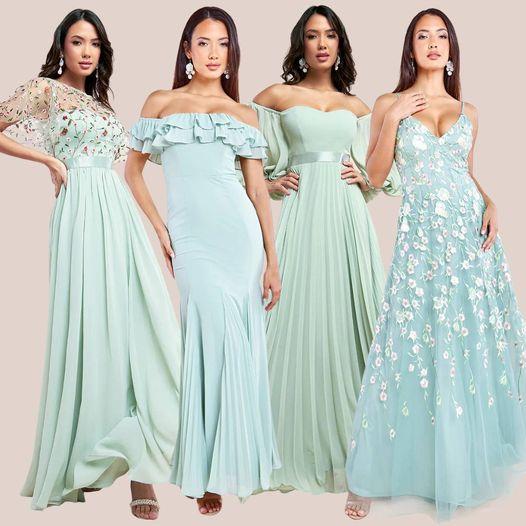
Midi and maxi dresses are both versatile and stylish options that can be worn for various occasions. However, choosing between the two can sometimes be a bit tricky. Understanding the differences between midi and maxi dresses and how to style them can help you decide which is best for your wardrobe. Here’s a detailed comparison of midi dresses and maxi dresses, along with tips on how to wear each one.
Defining Midi and Maxi Dresses
Midi Dresses
Midi dresses typically fall between the knee and the ankle, often hitting at the mid-calf. This length is flattering for many body types and can be styled for both casual and formal occasions.
Length: Falls between the knee and the ankle, usually mid-calf.
Styles: A-line, fit-and-flare, bodycon, wrap, and pleated.
Occasions: Suitable for work, casual outings, and semi-formal events.
Maxi Dresses
Maxi dresses are floor-length dresses that typically reach the ankles or the ground. They are known for their flowing, elegant silhouettes and can be dressed up or down.
Length: Falls to the ankles or the floor.
Styles: Empire waist, A-line, wrap, and bohemian.
Occasions: Ideal for casual wear, beach outings, formal events, and evening wear.
Advantages and Disadvantages
Midi Dresses
Advantages:
Versatility: Midi dresses are versatile and can be worn for various occasions, from work to casual outings.
Comfort: They offer ease of movement and are less likely to drag on the ground, making them practical for everyday wear.
Flattering Length: The mid-calf length can elongate the legs and create a balanced silhouette.
Disadvantages:
Tricky Length: The mid-calf length can be tricky for some body types, potentially making shorter individuals appear even shorter.
Seasonal Limitations: Midi dresses may not provide enough warmth in colder weather without proper layering.
Maxi Dresses
Advantages:
Elegance: Maxi dresses offer a flowing, elegant look that’s perfect for formal occasions.
Comfort: They provide coverage and comfort, making them suitable for various weather conditions.
Versatility: Maxi dresses can be dressed up or down, making them ideal for both casual and formal events.
Disadvantages:
Length Issues: The floor-length can be impractical for certain activities and may require alterations for shorter individuals.
Seasonal Considerations: While they provide more coverage, maxi dresses in heavy fabrics can be too warm for summer.
Styling Tips for Midi Dresses
Work Attire
Midi dresses are perfect for the office due to their modest length and sophisticated style.
Dress Choice: Opt for a fitted or A-line midi dress in solid colours or subtle patterns.
Footwear: Pair with closed-toe pumps or ankle boots for a polished look.
Accessories: Add a structured tote, a belt to define the waist, and minimal jewelry.
Casual Outings
For a relaxed, everyday look, midi dresses can be dressed down with casual accessories.
Dress Choice: Choose a flowy or wrap midi dress in playful prints or bright colours.
Footwear: Sneakers or flat sandals keep the look casual and comfortable.
Accessories: A crossbody bag, sunglasses, and a denim jacket complete the outfit.
Evening Events
Midi dresses can also be styled for semi-formal or evening events with the right accessories.
Dress Choice: A bodycon or pleated midi dress in a luxurious fabric like satin or silk.
Footwear: High heels or elegant flats add sophistication.
Accessories: Statement jewelry, a clutch bag, and a shawl or wrap for added elegance.
Styling Tips for Maxi Dresses
Beach and Casual Wear
Maxi dresses are ideal for beach vacations and casual summer days.
Dress Choice: Lightweight, flowy fabrics with bright colours or tropical prints.
Footwear: Flip-flops or espadrilles are perfect for a relaxed vibe.
Accessories: A wide-brimmed hat, oversized sunglasses, and a beach tote complete the look.
Formal Events
Maxi dresses can be dressed up for formal occasions with the right styling.
Dress Choice: Choose a dress in luxurious fabrics like chiffon, silk, or velvet with elegant details.
Footwear: Strappy heels or classic pumps add height and elegance.
Accessories: Statement jewelry, a clutch bag, and a wrap or shawl enhance the formal look.
Layered Looks
Maxi dresses can be layered for different seasons to increase their versatility.
Spring/Fall: Layer with a denim or leather jacket and ankle boots for a stylish transitional look.
Winter: Add thermal leggings underneath, a chunky knit sweater on top, and knee-high boots for warmth and style.
Summer: Keep it light with a kimono or a lightweight cardigan and sandals.
Choosing the Right Dress for Your Body Type
Understanding your body type can help you choose the most flattering midi or maxi dress.
Hourglass Figure
Midi Dress: Opt for fitted or wrap styles that accentuate your waist.
Maxi Dress: Choose dresses that cinch at the waist and flow outward, like A-line or empire waist styles.
Pear Shape
Midi Dress: A-line or fit-and-flare styles that balance your proportions.
Maxi Dress: Empire waist or dresses that highlight the upper body and flow over the hips.
Apple Shape
Midi Dress: Empire waist or shift dresses that skim over the midsection.
Maxi Dress: Empire waist or dresses that create a balanced silhouette and draw attention upward.
Rectangle Shape
Midi Dress: Dresses with belts, ruching, or peplum details to create curves.
Maxi Dress: A-line or wrap styles that add shape and dimension.
Inverted Triangle Shape
Midi Dress: A-line or fuller skirts that balance broader shoulders.
Maxi Dress: Dresses with fuller skirts and details at the lower part to balance the upper body.
Conclusion
Both midi and maxi dresses offer unique advantages and styling possibilities, making them valuable additions to any wardrobe. Midi dresses are perfect for a versatile, everyday look that can transition seamlessly from work to casual outings. Maxi dresses, with their elegant and flowing silhouettes, are ideal for formal events, beach vacations, and layered looks for different seasons. By understanding the benefits and styling tips for each, you can choose the perfect dress to elevate your style and suit your individual needs. Happy styling!
